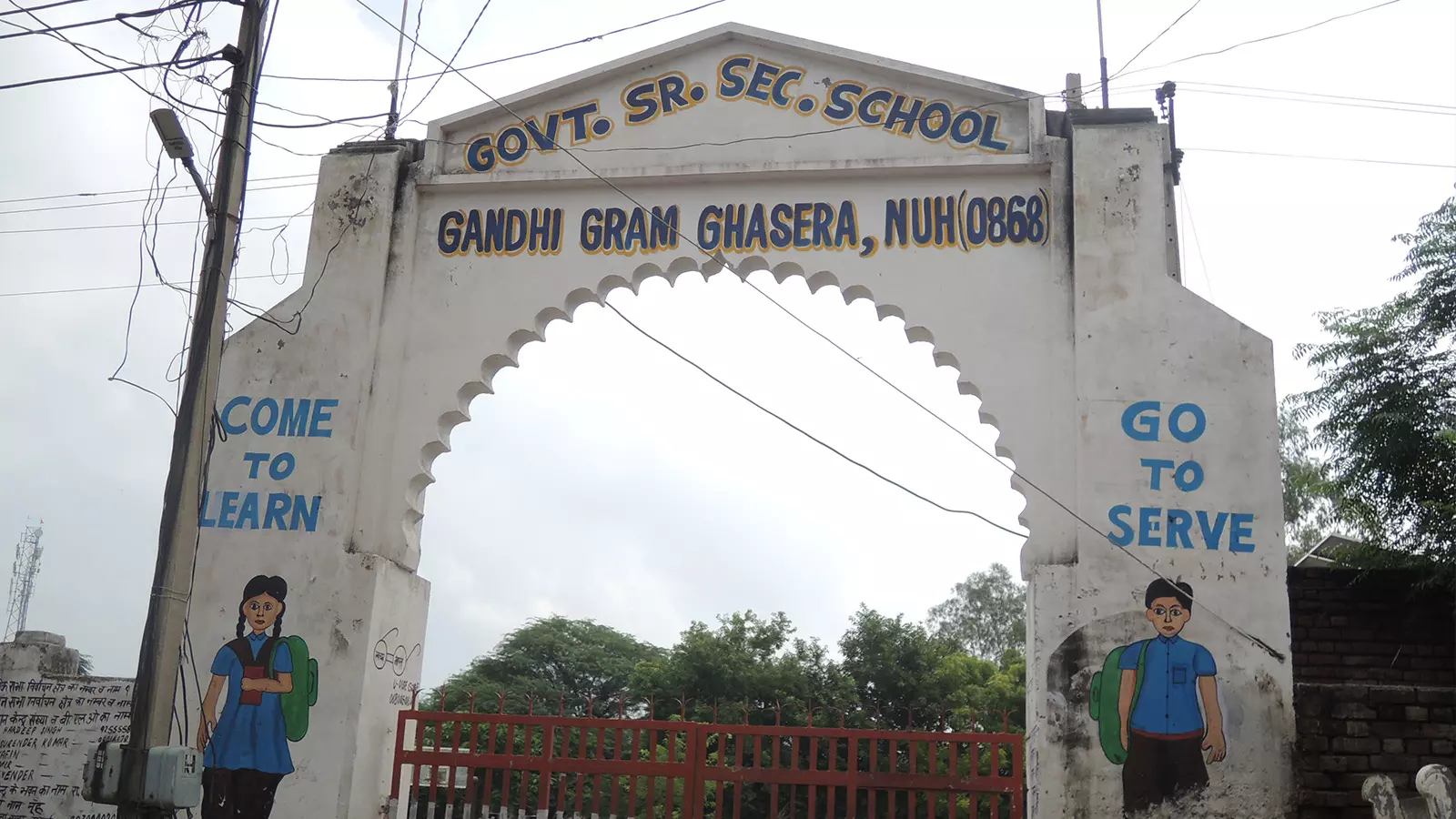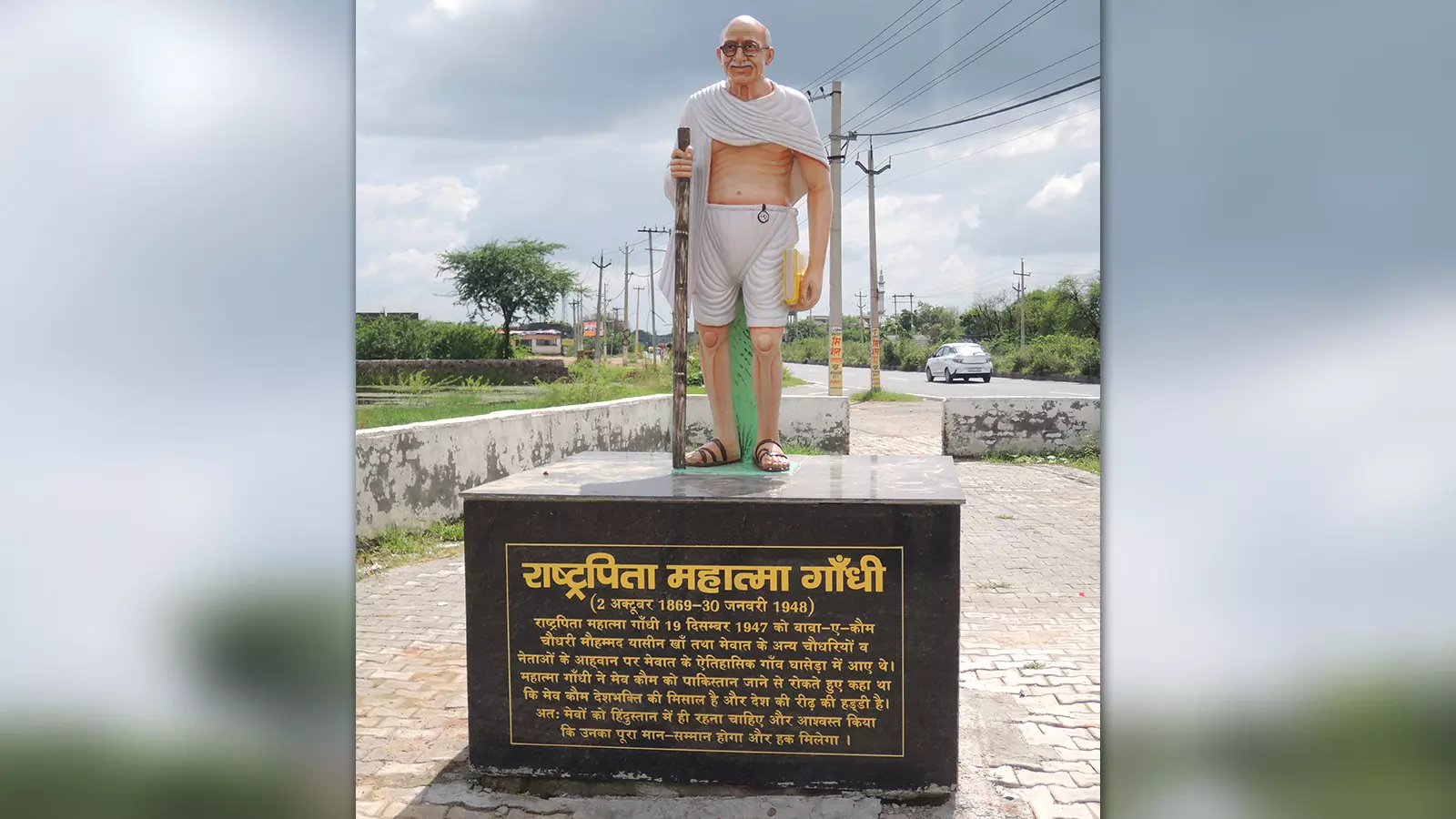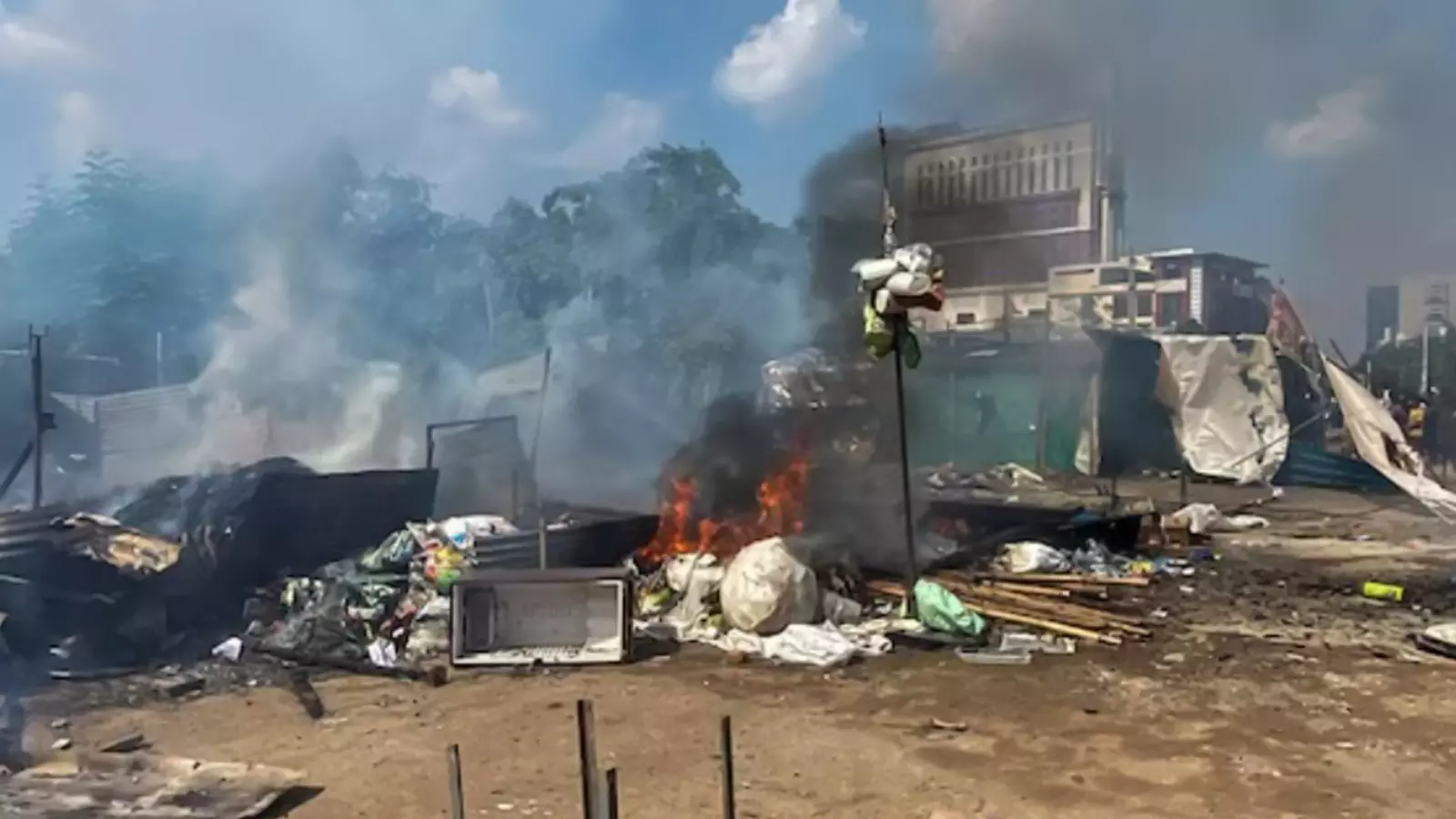
- Home
- India
- World
- Premium
- THE FEDERAL SPECIAL
- Analysis
- States
- Perspective
- Videos
- Sports
- Education
- Entertainment
- Elections
- Features
- Health
- Business
- Series
- In memoriam: Sheikh Mujibur Rahman
- Bishnoi's Men
- NEET TANGLE
- Economy Series
- Earth Day
- Kashmir’s Frozen Turbulence
- India@75
- The legend of Ramjanmabhoomi
- Liberalisation@30
- How to tame a dragon
- Celebrating biodiversity
- Farm Matters
- 50 days of solitude
- Bringing Migrants Home
- Budget 2020
- Jharkhand Votes
- The Federal Investigates
- The Federal Impact
- Vanishing Sand
- Gandhi @ 150
- Andhra Today
- Field report
- Operation Gulmarg
- Pandemic @1 Mn in India
- The Federal Year-End
- The Zero Year
- Science
- Brand studio
- Newsletter
- Elections 2024
- Events
Haryana elections: A year after riots, Nuh demands peace, dignity

TheThe songs and vote appeals blaring through microphones in Haryana’s Nuh are unable to break the eerie silence that envelopes the region since the 2023 Hindu-Muslim riots that killed over half a dozen people and left over 200 others injured.With one of the lowest per capita incomes, missing basic amenities, high unemployment, and the stigma of being a crime hub, Nuh sees the ongoing...
TheThe songs and vote appeals blaring through microphones in Haryana’s Nuh are unable to break the eerie silence that envelopes the region since the 2023 Hindu-Muslim riots that killed over half a dozen people and left over 200 others injured.
With one of the lowest per capita incomes, missing basic amenities, high unemployment, and the stigma of being a crime hub, Nuh sees the ongoing elections with as much hope for development as for washing off the taint of crimes. A village in particular, where the taint of the riots is acutely felt, is looking for change.
“There is a conspiracy to defame us, and there is a deliberate attempt to create a perception that Nuh is not safe and it is a crime-infested area. We get labelled as if crime does not happen in any other district of the country,” said Hamid Hussain, a 55-year-old school teacher in Gandhi Dham Ghasera.

Gandhi Dham Ghasera in wants peace to return to Nuh. Photo: Gyan Verma
Dominated by Meos, Gandhi’s name was added to the village after he visited the village and asked the predominantly Muslim Meos to not migrate to Pakistan.
People in the village claim the locals were not involved in the communal clashes, and the riots happened because of the involvement of outsiders who came with the intension to disturb the law and order in the district.
As Haryana prepares to elect the new government in less than two weeks with a direct contest between incumbent Congress MLA Altaf Ahmed and Bharatiya Janata Party’s Sanjay Singh in Nuh, residents of the region are not just trying to rebuild their own lives, but also want the incoming government to start the peace and development process to help them change the perception that Nuh is synonymous with crime.
Even as people hear out the promises being made by the candidates, which includes Nuh’s first woman contender Rabia Kidwai fielded by the Aam Aadmi Party, residents hope that the new government will be fair with them, and help them change the outlook of people towards Nuh.
“We are closely linked with the Mahabharat because Mathura is adjacent to the Mewat region. We will not allow anyone to start a new Mahabharat in Nuh by creating differences between brothers in Nuh. My shop remained open even during riots. Why should I shut my shop? I do not have anything to fear, this is my home and we live peacefully here,” said 38-year-old sweet shop owner, Kamal Prajapati in Gandhi Dham Ghasera village.
Prajapati, like many others in Nuh, believes that the region became the target of communal clashes because some outsiders seeking power, wanted to fuel Mahabharat between brothers who have lived peacefully in the region for centuries. Like Prajapati, the residents of Nuh believe that they continue to suffer from the stigma unleashed by the communal clashes. Daily businesses in the region have taken a hit because people of nearby areas no longer come to Nuh for trade, fearing communal tensions and crime.

Gandhis statue in the Nuh village named after him. Photo: Gyan Verma
Nuh is part of the Mewat region of Haryana, located west of New Delhi and is spread over parts of Haryana, Rajasthan, and Uttar Pradesh, bordering Mathura. It is among the few districts in India where Muslims are the majority.
“Our ancestors decided to stay in India, and they took part in the freedom struggle. But now we are suffering because we lack political representation at the highest level. Haryana is the land of Mahabharat, everyone in Haryana knows about Mahabharat. It was about a fight between brothers. There has been peace in Nuh for centuries, and no communal clash will happen to start a new Mahabharat between brothers,” Hussain said.
The good old ‘Devi Lal’ days
With their eyes set on the October 8 results, Nuh residents reminisce the days of two-time chief minister Devi Lal and his son Om Prakash Chautala, who hailed from the region.
The political journey of Devi Lal started during the British Raj when he took part in the freedom struggle and became an active member of the Congress. However, his association with the Congress was disrupted in 1975 when Emergency was declared in the country. Even though the political journey of Devi Lal and his family members grew from strength to strength, the family was also instrumental in forging a bond between the Jat farmers and Muslims of the Nuh and Mewat region.
The social and political bond between Hindus and Muslims in the Mewat region worked well for the family of Devi Lal and his sons because the Mewat region remains a stronghold of the family.
“It is extremely sad that the ongoing feud within the Chautala family has divided Indian National Lok Dal (INLD), and now the brothers are fighting for the political legacy of Devi Lal. For the past six years, Abhay Singh Chautala and his nephew Dushyant Chautala have been fighting over the political legacy of Devi Lal and Om Prakash Chautala, but it is the people of Nuh who are the biggest losers, as they have lost representation and political power in Haryana,” said Ratan Singh Deshwal, a 28-year-old farmer growing wheat and cotton in Chachera village.
Most residents of Nuh are admirers of Devi Lal and his son Om Prakash Chautala for bringing development to the Mewat region and also for forging a bond between Hindus and Muslims that has remained strong since the Partition of India.
“The divisions in the Chautala family made us voiceless. If Devi Lal was alive or Om Prakash Chautala was active in politics, communal clashes in Nuh would have never taken place. Devi Lal or Om Prakash Chautala would have never allowed outsiders to create problems in Nuh. After Om Prakash Chautala became politically inactive, the residents of Nuh became voiceless,” said Neeraj Singh, 28-year-old from Hathin village.
Skull caps and farmer protests
With less than a fortnight left for the people of Haryana to decide the fate of several political parties in the ongoing elections, the Muslims of the Mewat region feel that they would become more assertive of their rights and aspirations if they got their political voice back.
Remembering the days of the farmers’ protest on the outskirts of Delhi when farmers from Haryana, and Punjab camped on the borders of the national capital for nearly two years, many farmers of Nuh are in solidarity with the demands of their Haryana and Punjab counterparts.
“When the farmer protests happened, we also went to take part in it. But we did not wear our skull caps, and we did not wear traditional Muslim clothes. We only wore pants and shirts so that nobody could identify us as Muslims. We supplied milk, vegetables, and grains to farmers who came from Punjab and different parts of Haryana. We chose not to wear skull caps or traditional Muslim attire, otherwise, the entire movement would have become about Hindu-Muslim issues. We support the demand for a legal guarantee of minimum support price for farmers,” said Liaqat Ali, 34-year-old farmer, from Salamba village in Nuh.

The 2023 Nuh riots left half a dozen people dead and over 200 injured. Photo: PTI
Farmers of Nuh remember that after the protesters started to gather near the Delhi border to demand a legal guarantee on MSP, a meeting was called in Nuh by farmers belonging to the Muslim community, where it was decided that farmers taking part in protests would not wear skull caps and traditional clothes. “We went as far as Palwal in Haryana and also to Muzaffarnagar in Uttar Pradesh to take part in farmer protests and to attend meetings called by farmers organisation. Mewat is the most backward area, we hope that more money in the hands of farmers will lead to development,” said Mohammed Arshad, a 42-year-old farmer.
Mahatma Gandhi and Nuh
The camaraderie between the Hindus and Muslims of Nuh is not new. It is a bond that has passed the test of time.
It is interesting that Nuh is among the few districts in India that are dominated by Muslims. The Mewat, as it is popularly called, would not have remained a Muslim dominated region if Mahatma Gandhi had not intervened.
At the time of partition, when Muslims of Nuh and also from other villages in the Mewat region were preparing to migrate to Pakistan in search of a new home, the Jat villagers of Mewat invited Mahatma Gandhi to come to Nuh and ensure that Muslims from the region do not migrate.
“The name of our village is Gandhi Dham Ghasera because Mahatma Gandhi came here at the time of partition to stop our elders from migrating to Pakistan. Mahatma Gandhi stayed in Nuh for a few days to ensure that Muslims from the Mewat region do not leave, and he promised us that our political and social needs will be looked after,” said Mohammed Abid Hussain, a 55-year-old Imam at a local mosque.
